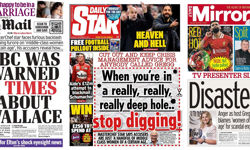The idea emerged as a handy means of avoiding the dreaded statutory underpinning of a new press regulator, but a charter brings with it plenty of problems of its own, and it wasn’t long before the bullets were flying all over again.
Royal Charters are tricky things. Using one to set up the verification body to oversee any new press regulator is a key stumbling block because it still appears to be horribly easy for interfering politicians to do away with it.
A clever wheeze?
Oliver Letwin, whose cunning wheeze the Royal Charter idea is, has tried to address this concern, building in safeguards against political meddling that, on the face of it, look robust.
Any attempt to tinker with the charter or to disband the verification body set up to oversee the regulator, would require the written agreement of the leaders of the three main parties. It would also have to be approved by a resolution in both the Commons and the Lords, and Letwin even defines ‘approved’ for us: “…at least two-thirds of the members of the House in question who vote on the motion do so in support of it.”
Then Harriet Harman had to come along and spoil the fun. Writing to Letwin, she said: “…the Privy Council cannot be bound by Royal Charter – it is the Privy Council that is in control of royal charter bodies. There is nothing to stop the Privy Council, which consists of ministers, from amending the charter at any time and thereby changing the terms of the recognition and regulatory framework.”
She went on to point out that this leaves the way open – for now at least – to interference with the recognition panel. Hardly the independence that is vital to any regulator hoping to be credible. And so it goes on.
One of the biggest problems in the post-Leveson debate has been the repeated reference to ‘the industry’ as though it speaks with one voice and thinks with one mind. One look at the divided reaction to the Royal Charter from the national press sinks that one.
And there is also widespread concern among regional newspaper editors that they have been bounced into a new, unwelcome and bewildering world, thanks to illegal acts and practices about which they had known nothing.
There is truth in that. Some have already argued for a separate regional complaints / standards body, and the draft charter does indeed refer to regulators in the plural, but this defies simple common sense. After all, a free press and freedom of speech are not two-tier concepts, and the industry should do all it can to resist any attempts to divide and rule.
Where were the police?
One bizarre feature of the Leveson debate is that the central point of it all was lost at an early stage: criminal acts lay at the heart of the phone hacking scandal, and yet the police failed to do anything about it.
No regulator or mediation body can do anything in the face of determined criminality. As Peter Preston pointed out, the General Medical Council wasn’t scrapped following the Harold Shipman case.
It would be easy to fill a room with victims of crime – people touched by murder or extreme violence, fraud, theft or intimidation. Their stories would all be moving, and probably shocking.
The victims of phone hacking are no different in this respect, but there is one vital exception – their voices have been given a disproportionate influence on matters unrelated to the crime perpetrated against them.
Laws are not shaped by the specific demands of victims – to do so would allow partiality and hurt to cloud rational judgement.
Phone hacking was clearly criminal, and should have been dealt with by the police. Instead, the politicians went straight down a well-worn and often unsatisfactory route: if in doubt, hold an inquiry.
Misinformation – accidental and wilful – has characterised the arguments surrounding Leveson, and it is surely the case that, as far as the newspaper industry’s bitter opponents are concerned, nothing will ever be good enough.
In his 1972 book, Pressures on the Press, Charles Wintour wrote: “The British people have an inexplicable passion for committees. Whenever something seems to be going wrong, a committee of sensible men is summoned to put it right.”
In essence, this is the story of press regulation. Some of the best brains in the land have looked periodically at the thorny question of the Press, its standards and general behaviour.
The Royal Commissions of 1946, 1961 and 1974 looked in enormous detail at concerns that are recognisable still: ownership of papers; unethical behaviour by some; how properly to regulate the press without fettering freedom of expression at the same time; possible sanctions and how to apply them…
Each Royal Commission came down on the side of allowing self-regulation, without statute.
In defence of the PCC
Let me be deeply unfashionable – much of the work undertaken by the PCC represents an effective and efficient service to the public, something acknowledged by Lord Justice Leveson. Even now, in the Commission’s twilight phase, the complaints keep coming.
The very nature of this work – its necessary confidentiality – means the PCC always tends to underplay its activities, a failure that left it wide open to attack.
The same old untruths were trotted out as fact: the PCC is run by editors… Daily Mail editor Paul Dacre chairs the PCC… The editors mark their own homework… Phone hacking is endemic across the industry… the lay commissioners are carefully chosen for their sympathies with the Press – especially laughable, that one. Just look again at precisely who sits on the Commission, for goodness sake. They currently include a judge, a leading trade unionist, and a former chief constable.
Leveson also looked at the relationship between the police and the press. A particular irony is that just prior to the phone hacking scandal, many editors were beginning to think relations between police and the regional press in some parts of the country had never been worse.
Press officers were – and have long been – routinely inserted between journalists and key police contacts. The flow of usable information is being reduced to a trickle, and there is less and less worth writing about.
Now, in the wake of Leveson, and the condemnation of meaningful contact between journalists and police officers by Elizabeth Filkin in her report on the Met, the situation is getting even worse.
And thanks to the economy and continuing changes wrought by technology, we are now least able to provide good journalism at a time when we need it most.
As the politicians are finding – yet again – tinkering with a free press in any way is extremely problematic, which is just as well: it should be very hard, if not impossible, to impose statutory controls on the media.
One gaping hole in Leveson’s inquiry was its failure to properly address the impact of the internet and social media, all readily available and currently impossible to regulate. In that important respect, it was rooted in the 20th century, its field too narrowly confined to the press.
The least-worst solution?
The Royal Charter is in many respects the ‘least-worst’ solution to issues raised by Leveson. Provided political interference can be prevented, the proposals outlined by PCC chairman Lord Hunt represent the first real attempt at providing a regulator with proper sanctions. As he says, it has never been tried before.
The threat of exemplary damages applied to those outside the system remains a significant problem for the industry. Everyone is equal before the law, and this harsh, frankly unnecessary idea is likely to fall foul of European law.
Small regional papers are dismayed at the prospect of a significantly increased workload in relation to handling matters previously mediated by the PCC, and many expect a surge of spurious and vexatious complaints from people merely seeking to make money.
And what a handy whipping boy the PCC has been? How selective the memories of the politicians and others who agreed to the way in which it was set up back in 1990, after the last Press crisis? It is astonishing to suddenly hear how everyone apparently knew how flawed the PCC was.
The internecine cynicism of the post-Leveson debate is deeply disturbing. It has been permitted to poison and shout down all rational discussion on a matter of the most crucial importance to this country, its society, and its long tradition of rigorous inquiry and free speech.
True democracy is frequently uncomfortable, and it follows that free speech – the right to offend, to speak out, even the right to get things wrong occasionally – is equally challenging, often unpleasant. Anything that hampers that – intentionally or otherwise – will leave us just that little bit poorer.
In what, at times, seemed like a dialogue of the deaf surrounding the inquiry, essential truths were eclipsed by vested interests and vociferous lobbies. What is surprising is the degree of traction they achieved, holing the British press below the waterline with such apparent ease.
The Royal Charter, then, remains the best hope of getting a new, robust and effective system of press self-regulation built on Leveson’s principles. The devil, however, remains in the detail.












